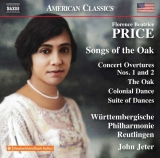Je mehr Musik man von Florence Price (1887-1953) hört, desto familiärer wird man mit ihrem Stil und ihrer Sprache. Gleich die Erste Konzertouvertüre zeigt die Verbundenheit der Komponistin mit dem Repertoire der Spirituals. Sie befasst sich mit dem Spiritual Sinner, Please Don’t Let This Harvest Pass und bildet mit einigen narrativen Episoden, schon fast eine Art Tondichtung. Das ist effektvoll und eindringlich, nicht zuletzt wegen der engagierten Interpretation.
Die erste Hälfte der Zweiten Konzertouvertüre basiert auf drei Spirituals – Go Down, Moses, sowie Nobody Knows the Trouble I’ve Seen und Ev’ry Time I Feel the Spirit. Im zweiten Teil werden die Themen ineinander verarbeitet, bis am Schluss Go Down, Moses überhandnimmt.
Die Tondichtungen Songs of the Oak und The Oak, beide aus dem Jahr 1943, drehen sich um die Eiche, sind aber inhaltlich doch sehr verschieden. Songs of the Oak ist eine malerische Waldszene. Läutende Glocken sollen an die die Unerbittlichkeit der ablaufenden Zeit erinnern, während die mächtige Eiche zum Symbol für die Ewigkeit zu stehen scheint.
The Oak galt lange als verloren, bis die Partitur in der Bibliothek der Eastman School of Music in New York auftauchte und im Jahr 2000 vom San Francisco’s Women’s Philharmonic uraufgeführt wurde,
The Oak enthält eine Reihe von originellen Melodien, die aber keine konkrete Geschichte erzählen, sondern, wie vermutet wird, eher den Zustand von Price beschreiben, die befürchtete, ihre Musik könne keinen Erfolg haben. Das würde die dramatischen und manchmal ängstlichen Passagen erklären. Die Musik endet regelrecht tragisch.
Colonial Dance und Suite of Dances beenden das Programm sehr beschwingt und farbig. John Jeter inspiriert auch in diesen Stücken die Württembergische Philharmonie Reutlingen zu einem unmittelbar ansprechenden Musizieren.
The more music one hears by Florence Price (1887-1953), the more familiar one becomes with her style and language. Right away the First Concert Overture shows the composer’s attachment to the repertoire of spirituals. It deals with the spiritual Sinner, Please Don’t Let This Harvest Pass and, with some narrative episodes, almost forms a kind of tone poem. It’s effective and haunting, not least because of the committed interpretation.
The first half of the Second Concert Overture is based on three spirituals – Go Down, Moses, and Nobody Knows the Trouble I’ve Seen and Ev’ry Time I Feel the Spirit. In the second section, the themes are worked into one another until Go Down, Moses takes over at the end.
The tone poems Songs of the Oak and The Oak, both from the year 1943, revolve around the oak tree but are quite different in content.
Songs of the Oak is a picturesque forest scene. Ringing bells are meant to remind us of the relentlessness of time running out, while the mighty oak tree seems to symbolize eternity. The Oak was long thought lost until the score was found in the library of the Eastman School of Music in New York and subsequently premiered by San Francisco’s Women’s Philharmonic in 2000,
The Oak contains a number of original melodies, but they do not tell a specific story, but rather, it has been suggested, describe the condition of Price, who feared that her music could not succeed. This would explain the dramatic and sometimes angsty passages. The music ends in downright tragedy.
Colonial Dance and Suite of Dances end the program very upbeat and colorful. In these pieces, too, John Jeter inspires the Württembergische Philharmonie Reutlingen to immediately appealing music-making.
























